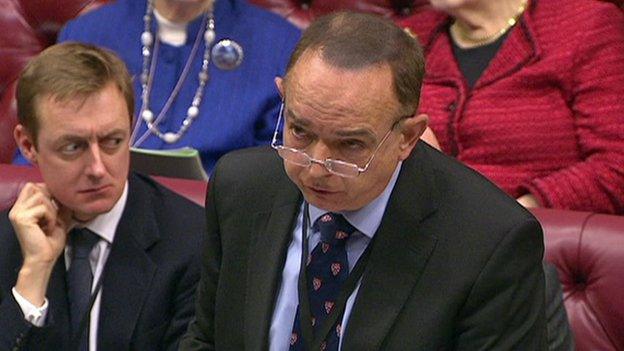Lords ponder Welsh powers, air taxes and draft laws
- Published
- comments

Lord Bourne: It isn't anticipated the draft Wales Bill will become 'a firm Bill' until the end of next year.
Most politicians at Westminster are currently focused on one big issue - how to respond to the threat of the so-called Islamic State. But the House of Lords managed to squeeze in a short debate on the future of devolution., external
The draft Wales Bill, external has had something of a kicking during its pre-legislative scrutiny phase so far and their lordships appeared not much more enthusiastic about the proposed law.
Former Plaid Cymru leader Lord Wigley kicked things off by citing what he called the "immense disappointment" felt by Sir Paul Silk (of Silk commission, external fame) that the Bill fails to deliver the "unanimous cross-party agreement" of that commission.
In particular, Lord Wigley complained that its recommendations on the devolution of policing and legislation on resolving disputes between the UK and Welsh governments had not been delivered. (He didn't complain that the Silk recommendation that a referendum be held before income tax powers are devolved has been ditched).
Wales Office Minister Lord Bourne of Aberystwyth, a former Silk commissioner, said Silk had produced 61 main recommendations, with 100 discrete proposals and more than 75% of them were in the draft Wales Bill.
But he reminded his former assembly colleague Lord Wigley: "The aim of this Bill is not primarily to take forward the Silk recommendations. It is to take forward the St David's Day agreement, external, which represented a political consensus."
Labour's Lord (Kenneth O) Morgan highlighted calls for a "reserved powers" model of devolution, which Welsh Secretary Stephen Crabb says he will deliver.
Lord Morgan said: "It's clear that the draft Wales Bill is less clear on this point and this has led to very fierce criticism from the Welsh government. It's noticeable that government after government treats Wales, which is strongly committed to the Union, much more ambiguously than it treats Scotland, which is not so committed. The noble lord is a very staunch and honourable supporter I know of Welsh devolution. Why are his colleagues so evasive?"
Lord Bourne: "It is not fair to say that progress is not being made on this issue. The draft Wales Bill, as the noble lord is aware, does represent a move forward in favour of a reserved powers model. Work is continuing as we speak in discussions between the Welsh government and the UK government in terms of that reserved powers model. It isn't an easy thing to resolve but significant progress is being made."
Liberal Democrat peer Lord Thomas of Gresford and crossbencher Lord Rowe-Beddoe (former chair of Cardiff Airport) wanted to know why Scotland would get control of air passenger duty but Wales would not.
Lord Bourne said it was not a straightforward issue: "In Scotland most people who travel by air would travel from Glasgow or Edinburgh but it's not the case that in Wales most people would necessarily travel from Cardiff Airport. People in the north for example would not think of doing so. There is also a significant issue about state aids which has to be looked at they are the two main reasons it wasn't taken forward."
'Timetable'
Challenged repeatedly over the Bill, the minister said: "I remind noble Lords that this is a draft Bill. It isn't anticipated that this draft Bill will become legislation, will become a firm Bill until the end of next year so there's a good period of time. as I repeat my Lords significant progress is being made and I'm very happy to update the house as and when."
Lord Bourne's timetable raised eyebrows. Was he really saying that the actual ("firm") Wales Bill, as opposed to the draft version, would not be introduced until the end of 2016? Stephen Crabb had previously suggested it could be introduced in February.
So is a 10-month delay on the cards? Apparently the minister mis-spoke. Perhaps it was the excitement generated by his team Leicester City's performances this season. I'm assured that the government's timetable remains unchanged and we should see the "firm Bill" around March next year.